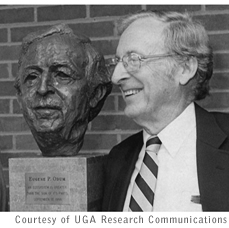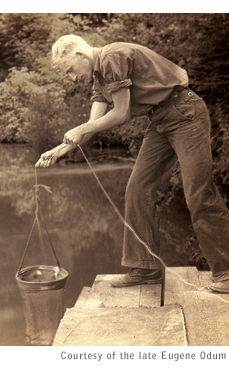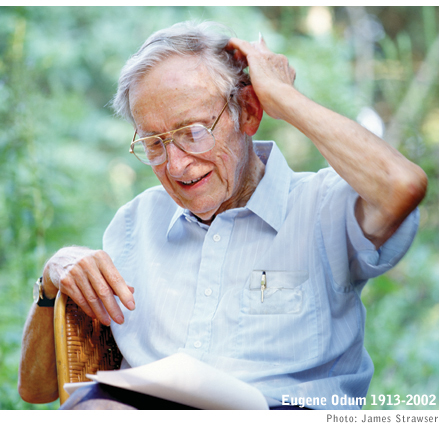


by Betty Jean Craige


The
bronze bust of Eugene Odum was created by the late William Thompson of
the University of Georgia’s Lamar Dodd School of Art.
 1933
photo of Eugene Odum.
1933
photo of Eugene Odum.
On Eugene Pleasants Odum’s 71st birthday, Sept. 17, 1984, the Institute of Ecology unveiled a bronze bust of him in the foyer of the new Ecology Building. Inscribed on the base of the sculpture was the sentence: “The ecosystem is greater than the sum of its parts.” Gene Odum had shaped the discipline of ecosystem ecology and had laid a foundation for environmentalism on the basis of his conviction that the ecosystem must be studied as an interactive whole whose function could not fully be understood by examination of its parts alone.
“[Eugene Odum’s] pioneering work in ecology has changed the way we look at the natural world and our place in it. Eugene Odum has had an important influence on the world by his insistence on the value of a quality environment.”
— Former President Jimmy Carter, from a 1996 documentary on Odum’s career. In 1977, the former president presented the Tyler Ecology Award to Eugene Odum in White House ceremonies.
Gene Odum came to the University of Georgia in September of 1940 with his wife Martha Huff Odum, who would become a leader in the Athens art community. He had already completed a Ph.D. in zoology with a major in ecology from the University of Illinois and had served a year as resident naturalist at the Edmund Niles Huyck Preserve in Rensselaerville, N.Y. And he had already begun developing the ideas, influenced in particular by Victor Shelford of Illinois, that he would spend the next six decades propounding: that nature tends toward stability; that the whole is greater than the sum of its parts; and that ecology is the study of large-scale systems and the interrelationships therein.

Graduate student Jeffrey Bewees (right) for an fMRI.
In 1953 Gene published Fundamentals of Ecology, the first textbook to approach the study of nature “top-down,” that is, ecosystem first. In its many editions it was translated into 13 languages. As a result of the textbook’s popularity, ecosystem became the watchword of the growing environmentalist movement in the 1970s.
Because he himself had focused primarily on the biological sciences, Gene appreciated opportunities to collaborate with his younger brother Howard Thomas Odum, who had studied the physical sciences. After spending the summer of 1954 doing research together on the coral reefs of the Eniwetok Atoll, the young ecologists showed in an award-winning paper1 that symbiosis maintained an equilibrium between corals and algae. Gene came to believe that symbiosis worked similarly in social systems: that interdependence leads to cooperation and hence to social stability.
“We often speak about creating new knowledge through research at the University of Georgia. Eugene Odum did exactly that. No one has been able to think about the environment in the same way since he began writing about the complexities and dependencies of the relationships among organisms.”
— University of Georgia President Michael F. Adams
Gene Odum left his mark on the University of Georgia in many ways. He obtained the initial grant from the Atomic Energy Commission that established the Savannah River Ecology Laboratory. He was instrumental in founding the Marine Institute on Sapelo Island. He and his SREL colleagues, including Frank Golley, created the Institute of Ecology, and he served as its first director. Through his classes, and his textbook, he taught several generations of students to think about nature in terms of ecosystems.
Gene’s students remember him as a brilliant scientist, an avid naturalist, an enthusiastic ornithologist whose keen ear enabled him to identify almost any bird he heard and a charismatic instructor who employed the principles of ecology in his analysis of any situation, whether environmental, social or political. In 1970, the year he was elected to the National Academy of Sciences, Gene gained statewide fame for demonstrating the economic value of Georgia’s undeveloped wetlands and thereby helping amass political support for the Coastal Marshlands Protection Act.
Gene was forced by state law to retire from the University at the age of 70, but he did not slow his pace. Recipient of the highest honors given in ecology — the Prix de l’Institut de la Vie and the Crafoord Prize, both of which he shared with his brother, and the John and Alice Tyler Ecology Award — he enjoyed his many invitations to write and speak about the future of the planet, which, he was fond of saying, “is not only our supply depot but also our home.”
Gene outlived his two sons, one of whom — Bill — was a distinguished ecologist at the University of Virginia, and his beloved wife Martha, who died in 1995 and whose watercolors he memorialized in The Essence of Place.
“Eugene Odum was one of the several most influential figures in the shaping of modern ecology during the twentieth century. A pioneer in the study of ecosystems, he brought the rigor and detailed knowledge of a professional naturalist to his daunting subject. As the author of the leading textbook on ecology, he further shaped and sped the development of his field. And, not least, as a teacher, his influence on successive generations was unparalleled in the numbers and importance of the students he taught.”
— University Research Professor Edward O. Wilson, Harvard University
Gene Odum was known to his friends and his family as extraordinarily energetic, obsessively driven to communicate his vision, eager to teach, appreciative of social occasions and generous with his time and money. He loved birds, dogs and sports, especially tennis, in which he excelled. He donated much of his accumulated wealth, derived largely from book royalties and awards, to the University of Georgia Institute of Ecology and to the Georgia Museum of Art. But he gave something even more valuable to the people who knew him: He taught us a way to understand the world as a giant ecosystem whose parts are all interconnected, and he instilled in us an environmentalist conscience.
1. The paper, “Trophic Structure and Productivity of a Windward Coral Reef Community on Eniwetok Atoll,” published in Ecological Monographs in 1955, won the Mercer Award from the Ecological Society of America in 1956.
For
more information about Eugene Odum, access
www.ovpr.uga.edu/researchnews/fall98/biosphere.html
and
www.ovpr.uga.edu/researchnews/93f/university.html
Betty Jean Craige is author of Eugene Odum: Ecosystem Ecologist and Environmentalist, published by the University of Georgia Press. She is the director of the University of Georgia Center for Humanities and Arts and University Professor of Comparative Literature.

For comments or for information please e-mail the editor: jbp@ovpr.uga.edu
To contact the webmaster please email: ovprweb@uga.edu
![]()